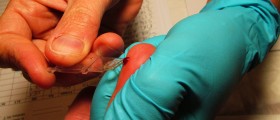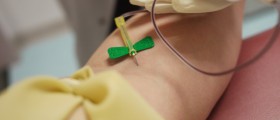
The CPK blood test is a laboratory blood test. It is designedto measure the level of the enzyme creatine phosphokinase (CPK). This test isproven useful in diagnosing and treating muscle damage after the stroke, heartattack, muscle dystrophy or after some injuries
CPK
CPK can be found in the brain, heart and skeletal muscles. Themain function of this enzyme is to convert creatine into the form that is usedin the body as the energy fuel.
After the muscle injury in the body, muscle cell release theircontent (including CPK) into the bloodstream. Injury therefore results inelevation of the CPK level in the blood, which is confirmed by CPK test.
Elevated CPK indicates muscle damage in the body. It mightbe caused by some pathological process in the body, including: muscle injury, myocarditis,heart attack, muscle dystrophy, rhabdomyolysis, myositis or malignanthyperthermia. Sometimes, hard workout could also cause muscle damage and leadto increase of CPK in the blood.
There are also CPK enzymes in the brain and in the heart. Theseare different types of CPK, and this fact is very helpful to determine the origin ofthe damage in the body.
In healthy men, CPK levels are between 12 and80ml, or 55 to 170ml. Healthy women have slightly lower levels of creatine intheir body.
CPK Blood Testing
CPK blood test is the same as any other blood test. Doctor willdisinfect the vein on the inside of the elbow, insert a needle and draw a smallsample of blood. After the blood is collected into the blood collection tube thedoctor will remove the needle. It is recommended to apply some pressure on the puncturespot, to stop the bleeding, until the doctor cover the puncture spot with thebandage. Blood sample is then sent to the laboratory to be tested for CPKlevel. Sometimes, it might be necessary to repeat the CPK test several times.
Patients that had previous problems with blood drawing orthose using blood thinners should inform the doctor before the blood draw. All patients are advised to avoid exhausting activities beforethe blood test.
Results
Low levels of CPK might occur in people with alcoholic liverdisease and rheumatoid arthritis.
High levels of CPK, on the other hand, indicate muscleproblems, such as, heart attack, muscle inflammation and damage or stroke. Seizuresand hypothyroidism can also cause abnormal CPK results.

















Your thoughts on this
Loading...